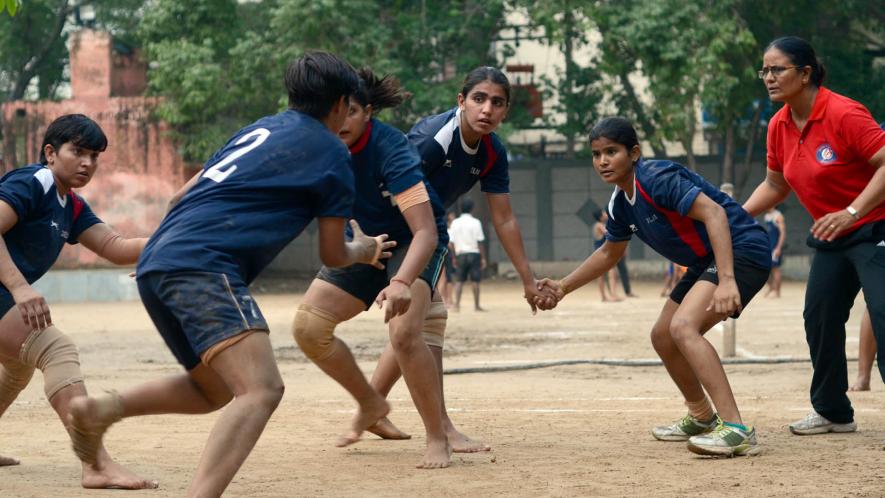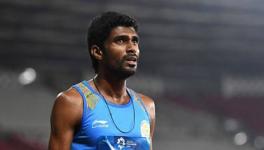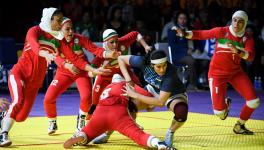Indian Kabaddi’s Gender Paradox Leaves Women Players Facing A Perennially Uncertain Future

Neelam Sahu (in red) started Palam Sports Club in 1995 as a place for girls from underprivileged backgrounds to learn, play and gain employment via kabaddi. (Picture: Vaibhav Raghunandan, 2015)
The country is opening back up. Carelessly and cautiously, irrationally and mostly without choice. With the reopening many professions are faced with a new reckoning. In this reopened new world, there is much that will change. Sports has already rethought many strategies, revoked others and is finding solutions for many on the go. Some old divides though have still to be considered. And despite the hardships of the past few months few have thought of them and what happens next.
In a corner of Dwarka, for over a quarter of a century, the Palam Sports club has silently transformed young girls’ lives. The club trains girls between the age of 10 and 26 in kabaddi, and has over the years produced many players who have won laurels at the national level. As many as twelve have gone on to win them for the country. When Neelam Sahu opened the club’s doors in 1995 it was to provide a platform for girls from underprivileged backgrounds a way out, sport not just a frivolous pastime but a grounding ritual that can help secure a livelihood.
Also Read | India U-17 Squad Girls Struggle to Survive as Football Big Boys Talk about Return of Big Leagues
"Parents always ask why their child should pursue kabaddi,” Sahu says over a phone call from her house in Dwarka. The academy is a short walk away, and yet too far right now. “Many parents have asked us this. Isn’t it better for them to pursue academics?” It is a valid thought.
The Pro Kabaddi League has opened many doors for kabaddi players across India. Locality heroes have become franchisee staples. State and National legends have become household names in households in parts of the country that are far removed from the rural beginnings of this ruthless sport. All these benefits though have gone to the men. For women kabaddi players little has changed.
“Women players have very few career opportunities,” Sahu says. “Male players have the luxury to change jobs via sports quota. They get jobs freely even after they retire. But for women there are no jobs after they are done with kabaddi. The government needs to intervene and create some avenues for them. They need more opportunities. That's the only way women's kabaddi will rise. Otherwise going forward the sport will only decline further.”
India’s shock defeats at the Asian Games in 2018 was a huge wake up call. The men lost two games at the event, two more than they had done for the 28 years before Jakarta. The women had won gold at the event since its inception in 2010. Both fell to the same foe, a country that is nemesis, founding partner, chief rival and greatest asset -- Iran.
Almost immediately damage control began. But first more damage had to be wreaked. A rebel alliance, the National Kabaddi Federation of India (NKFI) accused that team selections for the Asian Games had been done without conducting trials. They said that most players in the squad were there because of their clout and leverage within the federation. The NKFI demanded a new set of trials, one that would involve the Asian Games teams and a team with players overlooked by the AKFI. The Delhi High Court agreed. Unfortunately though, the Court’s order for fresh trials arrived on August 17, a day before the Asian Games began. A fresh set of orders were given: the trials would be held after the continental competition to ascertain the quality of the teams after they contend with the freshly selected squads.
The Asian games team never turned up. The AKFI, to comply with the court order for trials, sent out a team of junior players from Delhi-NCR. Soon enough all was forgotten. The league continued on, ramping up its coverage, its game schedule and its mileage. They papered over the cracks with conversations about evolving game style, flushed out old players and reorganised some structures in the national team. All of this again, was solely focussed on the men.
Women’s kabaddi remained in the afterthought limbo it always had. Existing without seeming to. On ground nothing changed.
Like it did small sports institutions across India, the coronavirus crises disproportionately affected the Palam Sports Club shuttering them for three months straight. The players were forced to train at home with the few fasciitis they had available. Sahu did her best under the circumstances, giving them a schedule and checking up on them regularly. The academy was off limits.
“The risk is too much and just five players practising the game does not make any sense,” Sahu says. This is a reckoning that many contact sports will face as things roll along. Soon enough solutions, long and short term will be found. It is the larger scheme of things, the future of her wards, their employment opportunities and the funding cuts that will affect it that worry Sahu.
Bhavna Yadav, who has represented India internationally stated that “there is a lot of discrimination against women players. We are not provided with many opportunities.
“There is a lot of discrimination against women players,” Bhavna Yadav, 22, an India international from Palam Sports Club says. “Just like men, even women should have their own Pro Kabaddi League. They should get equal opportunities along with equal pay. If a male player gets a lakh then the woman gets 75,000. Men get paid more than women in tournaments across the board and I want this to change.”
Yadav is not alone asking for this change. Earlier this year, Sonali Shingate (who was part of the silver medal team in 2018) called for change in the same way as the youngster did. Even the words were the same.
“There should be a tournament like the Pro Kabaddi League for the women as well,” Shingate said in an interview with Sportskeeda. “Male players have achieved stardom and have also landed a decent job after making a name for themselves in the PKL. The boards such as Railways, Services, and Banks offer them a reputed job. However, women find themselves a position in the Railways department only.”
As much as titles matter, jobs do too. And in the latter there still exists the inherent bias associated with a sport considered the domain of rural India. Shubh Tiwari who represented Delhi at the Nationals earlier this year, attested to how despite kabaddi’s 'traditional sport' badge it is still not as valued as the others. Comparing their resources to facilities other players are provided in other sports such as cricket, she said, “I would like to see more opportunities for women in kabaddi. The facilities are not provided to us to the extent as other sports. The pay is also not good...”
While men’s kabaddi’s catchment regions extend throughout north India and western India, the inherent sexism existent in large swathes of this land plays its own part in reducing the women talent pool. “This is a contact sport and there are chances of injury. Parents do not encourage girls that much. They have a different mindset...”
And yet, Tiwari knows in her heart, that this game is for everyone and anyone. “This team sport can be played by anyone and everyone. All you need is a good coach and a good ground. It is a sport that needs attention. While for men it is not difficult, women don’t have much.”
Get the latest reports & analysis with people's perspective on Protests, movements & deep analytical videos, discussions of the current affairs in your Telegram app. Subscribe to NewsClick's Telegram channel & get Real-Time updates on stories, as they get published on our website.
























